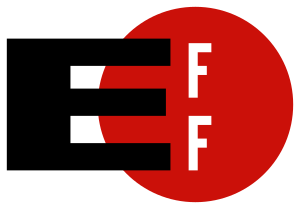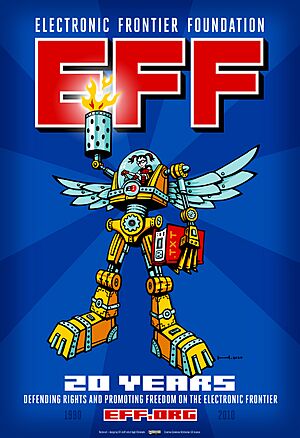Electronic Frontier Foundation facts for kids
Logo since July 2018
|
|
| Abbreviation | EFF |
|---|---|
| Formation | June 10, 1990 |
| Founders | Mitch Kapor, John Gilmore and John Perry Barlow |
| Type | Nonprofit |
| Purpose | Digital rights |
| Headquarters | San Francisco, California, U.S. |
|
Region
|
Worldwide |
|
Membership
|
40,000 |
The Electronic Frontier Foundation (EFF) is a group based in San Francisco, California. It is a non-profit organization that works to protect people's rights in the digital world. It was started in 1990 to help make sure people have freedom and privacy when using the Internet.
The EFF helps people in many ways. It provides money for legal help in court. It also gives advice to judges and lawmakers. The EFF protects individuals and new technologies from unfair legal problems. It works to show when the government makes mistakes. The group also supports new technologies that help keep personal freedoms online. It watches new laws that might harm people's digital rights. The EFF also finds patents that might stop new ideas and tries to challenge them.
Contents
History of the EFF
How the EFF Started
The Electronic Frontier Foundation began in July 1990. It was founded by John Gilmore, John Perry Barlow, and Mitch Kapor. They started the group because law enforcement agencies were not understanding how online communication worked. They felt there was a need to protect people's rights on the Internet.
In April 1990, an FBI agent visited John Perry Barlow. The agent was asking about stolen computer code. Barlow realized the agent did not understand computer technology very well. He felt that many people's freedoms could be at risk because of this lack of understanding.
Barlow shared his experience online. Mitch Kapor, who had a similar experience, contacted him. They both agreed that digital rights needed to be defended. Kapor offered to pay for legal help. They worked with lawyers to defend computer users who had been targeted by the Secret Service. This created a lot of public interest.
Other people, like John Gilmore and Steve Wozniak, offered financial support. In June 1990, Barlow wrote an article online called "Crime & Puzzlement." In it, he announced plans to create an organization. This group would help with education, lobbying, and legal cases related to digital speech.
This idea gained more support. Barlow held meetings with computer industry leaders. He believed that America was entering the "Information Age" without proper laws. He felt a formal organization was needed to deal with these issues. So, the Electronic Frontier Foundation was officially started on July 10, 1990. Kapor and Barlow were the founders. Soon after, Gilmore, Wozniak, and Stewart Brand joined their board of directors.
In 1990, Mike Godwin became the EFF's first staff lawyer. Over the next few years, the organization grew. It opened a second office and had new leaders.
Early Legal Cases
The EFF's creation was partly due to a big search and seizure case. This happened to a company called Steve Jackson Games in 1990. The Secret Service mistakenly thought one of their game projects was a guide for computer crime. They raided the company's offices. The search warrant was issued too quickly. The game company later said their emails were accessed without permission. At that time, digital emails were new, and laws didn't fully protect them.
The Steve Jackson Games case was the EFF's first major case. It helped the EFF become known for protecting computer and Internet freedoms.
Another important case for the EFF was Bernstein v. United States. In this case, a programmer named Daniel J. Bernstein sued the government. He wanted permission to share his encryption software and a paper about it. Encryption is a way to scramble information so only certain people can read it. The EFF has also defended other people like Edward Felten, Jon Lech Johansen, and Dmitry Sklyarov.
Growth and Changes
The EFF first had offices in Boston. By 1993, the main offices moved to Washington D.C. During this time, the EFF focused on influencing national policy. This was not liked by all members. In 1994, Jerry Berman left the EFF to start another group.
In 1995, the EFF moved its offices to San Francisco, California. It wanted to refocus on its main goals. The organization changed leaders several times. In 2006, the EFF opened an office in Washington, D.C. again. In 2012, the EFF started raising money for a new headquarters building in San Francisco. They moved into this new building in April 2013. In 2015, Shari Steele stepped down as executive director. Cindy Cohn became the new executive director.
The DES Cracker
In the mid-1990s, the EFF was worried about the US government's rules on encryption. The government would not allow strong encryption products to be exported unless they had a "key recovery" feature. This feature would let the government decrypt information. The EFF also challenged claims that governments could not break codes protected by the Data Encryption Standard (DES).
The EFF helped build a special machine called the EFF DES cracker. This machine cost $210,000. It was designed to break the DES code. On July 17, 1998, it broke a DES message in 56 hours. On January 19, 1999, working with another group, it broke a message in under 24 hours. The EFF shared the plans for this machine publicly. Within four years, a stronger encryption standard, the Advanced Encryption Standard, replaced DES.
What the EFF Does
Working with Laws
The EFF is a strong supporter of the Email Privacy Act. This act aims to protect the privacy of emails.
Legal Cases
The EFF regularly takes part in lawsuits in the US legal system. It does this to achieve its goals. The EFF has always been against "SLAPP" lawsuits. These are unfair lawsuits meant to stop people from speaking freely. The EFF supports laws that protect free speech from such lawsuits. Many important technology law cases have involved the EFF. These include MGM Studios, Inc. v. Grokster, Ltd. and Apple v. Does.
Internet Archive Case
The EFF represented the Internet Archive in a case called Hachette v. Internet Archive. During the COVID-19 pandemic, the Internet Archive started a system to lend digital copies of physical books. This allowed users to borrow digital books that the archive had in its physical library. Hachette, a publisher, won the case. The Internet Archive had to stop its digital book lending system.
Patent Busting Project
The Patent Busting Project is an EFF effort to challenge patents that they believe are unfair. These patents might stop new ideas or limit online expression. The project started in April 2004. It involves showing the harm caused by these patents. It also involves challenging them at the United States Patent and Trademark Office.
Voting Rights Work
The EFF has long supported paper records for voting machines. They spoke about this after the 2004 United States presidential election. Later, they helped fund research that showed weaknesses in some voting machines. Since 2008, the EFF has run the Our Vote Live website. This site helps quickly record problems or attempts to stop people from voting on election day.
The EFF was active during the 2016 United States presidential election. This was because of online "phishing" related to election results. Phishing is when someone tries to trick you into giving them your personal information online. A computer security professor, J. Alex Halderman, wrote an article suggesting a recount in some states. In response, a hacker sent mean emails to students, pretending to be from Halderman. The EFF shares information about these issues. It also works to reduce online phishing.
Improving Online Rules
In 2018, the EFF joined other groups to write "The Santa Clara Principles." These are guidelines for social media companies. They suggest:
- Making public statistics about removed posts.
- Notifying users with clear reasons if their posts are deleted or accounts banned.
- Giving users a chance to appeal these decisions, with a human reviewing the appeal.
Six months later, these groups asked Facebook to adopt these principles. They also asked Facebook to warn users who interacted with fake law enforcement accounts.
In 2019, the EFF gave advice about a UK government paper on online harms. They said some ideas to increase social media rules could be misused. Also in 2019, the EFF launched a website called "TOSsed out." This site shows cases where moderation rules were not applied fairly. Cindy Cohn from EFF said that the power to silence people can be used in many ways.
Protecting the Internet's Core
In December 2022, the EFF and many other groups asked Internet infrastructure providers to stop controlling website content. Infrastructure providers are companies that provide the basic services for the Internet to work. These groups argued that many providers can only block an entire website. This leaves users with little understanding or way to fix the problem. They were worried that governments might pressure these providers to block opponents or minority groups.
The groups believe that social media platforms and websites that users directly interact with are better at moderating content. These platforms can remove specific content. They can also punish accounts in smaller ways. They can also explain their decisions and offer appeals.
This effort started after a campaign called "Drop Kiwi Farms." This campaign convinced several Internet service providers to stop providing service to Kiwi Farms, a controversial online forum.
Awards from the EFF
The EFF gives out two types of awards. These awards recognize work that supports their goals.
EFF Awards
The EFF Awards, previously called the EFF Pioneer Awards, are given every year. They honor people who are "leaders who are extending freedom and innovation on the electronic frontier." In 2017, some of the people honored were Chelsea Manning, Mike Masnick, and Annie Game.
EFF Cooperative Computing Awards
The EFF Cooperative Computing Awards are four awards. They are meant to encourage Internet users to help solve big science problems. These awards are given to the first person or group who finds a prime number with a very large number of digits. An anonymous donor funds these awards. The awards are:
- $50,000 for a prime number with at least 1,000,000 digits – Awarded April 6, 2000
- $100,000 for a prime number with at least 10,000,000 digits – Awarded October 14, 2009
- $150,000 for a prime number with at least 100,000,000 digits
- $250,000 for a prime number with at least 1,000,000,000 digits.
Software by EFF
The EFF has created some software and browser add-ons. These include Switzerland, HTTPS Everywhere, and Privacy Badger.
Secure Messaging Scorecard
The EFF had a project called Secure Messaging Scorecard. This project "evaluated apps and tools based on seven specific rules." These rules checked if messages were encrypted and if the code had been checked recently. A new version of this scorecard is being developed.
Support for EFF
Money and Funding
As of 2021, Charity Navigator gave the EFF a rating of four out of four stars. This included high ratings for its financial efficiency.
In 2011, the EFF received $1 million from Google. This was part of a settlement for a privacy issue involving Google Buzz. The Electronic Privacy Information Center and other groups protested this. They felt that most of the money went to organizations that worked for Google. The EFF also received another $1 million from Facebook in a similar settlement.
Other Support
The art group Psychological Industries has made buttons to support the EFF. These buttons use images from popular culture.
In June 2014, the EFF flew a large balloon, called a blimp, with Greenpeace. They flew it over the NSA's Utah Data Center. This was a protest against what they believed was illegal spying by the NSA.
See also
 In Spanish: Electronic Frontier Foundation para niños
In Spanish: Electronic Frontier Foundation para niños
- Anna's Archive
- Citizen Lab (U of Toronto)
- Clipper chip
- Code as speech
- Digital rights
- European Digital Rights (EDRi)
- Electronic Frontier Canada
- Electronic Frontiers Australia
- Freedom of the Press Foundation
- Information freedom
- Internet censorship
- League for Programming Freedom
- OpenMedia.ca
- Open Rights Group (UK-based)
- Protection of Broadcasts and Broadcasting Organizations Treaty
- Reporters Without Borders
 | Aurelia Browder |
 | Nannie Helen Burroughs |
 | Michelle Alexander |






